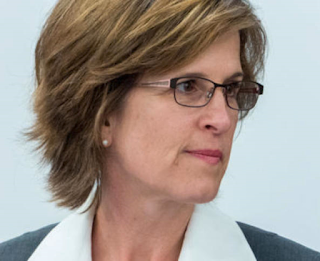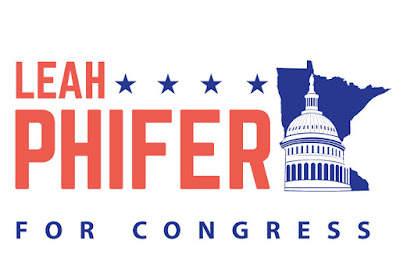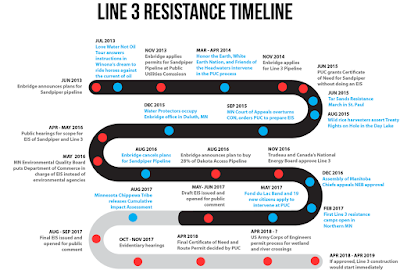Archive for the ‘Pipelines’ Category
It isn’t surprising that Gov. Tim Walz has caved to environmental activists. In fact, it’s entirely predictable.
Gov. Tim Walz says his administration will continue to appeal regulatory approval of the Enbridge Energy Line 3 pipeline project in northern Minnesota. State utility regulators last summer approved Enbridge Energy’s plans to build a new $2.6 billion pipeline to replace the aging and corroding Line 3. But, former Gov. Mark Dayton’s Department of Commerce appealed that decision. Walz on Tuesday said his administration will continue that effort.
Gee, I wonder what could’ve caused that cave. Perhaps this?
Last month, more than 50 people, including scientists from the liberal activist group Science for the People, gathered in the governor’s reception room to say the science is clear the Line 3 upgrade will aggravate climate change by facilitating further use of fossil fuels.
Gov. Walz is just as owned by the lefty environmentalists as Gov. Dayton was. No wonder our economy isn’t what it could be.
I had to pinch myself to be certain I’d read this article right. I wasn’t imagining things. Sure enough, it really opened by saying “Two of the largest trade unions in Minnesota are backing the reelection campaign of Republican representative Jason Lewis against a Democratic business executive. The carpenters’ union and International Union of Operating Engineers Local 49, both of which endorsed Hillary Clinton, will support the first-term congressman in the midterm elections in his rematch against former health care executive Angie Craig. Labor leaders praised Lewis’s record in Congress, highlighting his support for domestic energy development as well as his willingness to buck his political party. Lewis has supported Davis-Bacon, which favors union wage levels in federal projects despite the push in the conservative movement to abolish wage mandates.”
Here’s their explanation:
“In Jason’s time in Congress he has cast repeated votes in support of Davis-Bacon prevailing wage and has led on the issue of changing school curriculum to encourage more people to look at careers in the construction industry,” carpenters’ spokesman Adam Duininck said in a release.
First, if the name Adam Duininck sounds familiar, it’s because he was Mark Dayton’s chair of the Met Council. Then there’s this:
“Jason Lewis has made an effort to get to know our Union, understand our issues, and has taken politically tough stances in support of good paying Union jobs,” George said in a statement. “We don’t always agree on every issue, but we know that when it comes to supporting our jobs, he has stood with us, and that is why we are standing with him.”
Lewis offered this reply:
“I’m working hard to make certain we get Enbridge so we get the Pine Bend refinery in the second district … the oil it needs to grow the economy,” Lewis said in the Oct. 21 debate. “My opponent says, ‘well Sierra Club won’t let me endorse that.'” Lewis pledged to continue advocating for local laborers in Congress. He said he will continue to focus on workforce training and revamping the apprenticeship system, one of the Trump administration’s priorities, “so labor groups are able to thrive with adequately trained laborers.”
“This nation was built on the backs of hardworking Minnesotans like those belonging to these two groups and it is important we support them with our policies in Washington,” he said in a statement. “I am proud to have supported them in my first-term in Congress and look forward to continuing to work on their behalf.”
This is a major victory for Lewis. This can’t help Angie Craig.
Now that the Minnesota Public Utilities Commission has said that the Line 3 Pipeline replacement is needed, a new round of litigation is certain to follow. That’s because PUC’s findings “differs from the Minnesota Department of Commerce’s opinion that Line 3 is unnecessary for the state.”
This is what’s wrong with Minnesota’s regulatory system.
According to the article, “The utilities commissioners have many options for what to do regarding Line 3. They could outright deny it, or agree with the staff conclusion and grant a certificate of need. Or they could approve Enbridge’s plan but only under certain conditions. The commissioners could choose some combination of 12 different conditions, such as requiring renewable energy to offset the pipeline’s impact or setting up a fund to remove the old line.”
Or they could choose to throw darts at the report and ignore it entirely. I’m half-kidding, of course. It isn’t surprising that these projects take 10+ years to approve. The market should determine whether a pipeline is required. The last thing we need are a bunch of political busybodies telling us what we need and what we don’t. These aren’t experts. They’re activists with different opinions. Minnesota needs layers of regulators like property owners need arsonists on their payroll.
It’s time to streamline this process so a quick decision can be made. Further, it’s time to call these environmental activists out. They’re putting themselves first instead of putting the country first. Put a different way, these environmental activists aren’t patriots. They should be ashamed of themselves. Period.
With the DFL primaries likely to be contentious, some major rifts have gotten exposed. In his weekly commentary, Harold Hamilton noted that “the DFL is wholly funded, owned, and operated by the wealthy urban elites who hail from about three zip codes in Minneapolis and Saint Paul. These king makers are extremely liberal in their world view and thus support candidates who are extremely liberal in their world view. In short, the DFL establishment these days favors extreme liberals who hail from the urban core.” (Hamilton predicts that Erin Murphy and Keith Ellison will win their primaries and be the DFL’s general election candidates for governor and AG respectively.)
That necessarily means some awfully hurt feelings. As Hamilton said, “Lori Swanson specifically pointed out in her announcement that she was running for governor that she is in favor of gun rights, a hot button topic. Erin Murphy, on the other hand, is a gun grabber and has no regard for the Second Amendment, as does her running mate.”
Anyone that thinks rural DFLers and metro DFLers won’t duke it out over the Second Amendment is kidding themselves. This is one of the existential fights that DFL Chair Ken Martin has tried avoiding for 5+ years. Hamilton noted that “there is a growing schism between the party’s urban, liberal faction and its rural ‘Reagan Democrat’ pragmatic faction.” Here at LFR, I’ve been chronicling that schism for years. It’s inevitable that the divorce happen.
Mitch Berg correctly notes that “It’s pretty clear the DFL is sliding toward Metro-only status. If they lose CD8 and possibly CD1 this year (both are more possible than at any time in years), and with the knowledge that Colin Peterson’s Potemkin seat in CD7 will never be replaced by a Democrat again when he retires), it’ll really be official, even if they someday flip CD3.”
Tonight on Almanac, the 3 DFL gubernatorial candidates did their best to spin the differences between rural issues and metro issues. They failed. Each played nice to a certain degree, though Erin Murphy definitely attacked Walz on the NRA. When rural voters hear that, it’s inevitable that they think the DFL is the party of gun grabbers. What’s clear is that these candidates either don’t understand rural voters or are too busy pandering to city voters.
Murphy and Maye Quade have opposed pipelines and mining. They voted for the buffer strips, too. These positions will alienate rural voters. Amy Koch nails it during the roundtable:
During the Roundtable, Eric Eskola mentioned the Eighth District DFL Primary. They’d run out the environmentalist in that race. Now, 2 more environmentalists have filed to run in the primary. These candidates won’t win but they will keep that fight fresh through August. That isn’t just a disagreement. Potentially, it might turn into a civil war.
If the DFL can’t resolve these major differences, a divorce is inevitable. It’s just a matter of when.
This LTE highlights what I think is a Range war. It starts by saying “I got a big chuckle out of comments by Governor Mark Dayton (MDN 5/13) ‘Everyone on the Range should know: the state government is on your side.’ In fact, I still can’t stop laughing! His comments remind me of the old adage ‘The Three Biggest Lies: the check is in the mail, of course I’ll still respect you in the morning and I’m from the government…I’m here to help you.'”
One thing comes through clearly in that opening: Rangers don’t trust Gov. Dayton. That should frighten whoever becomes the DFL gubernatorial candidate. Tim Walz’s Lt. Gov. pick is a wild-eyed environmentalist. That’s before considering the fact that Walz was a longtime NRA member who just threw that record overboard to win the endorsement. While she was part of the Executive Council, Rebecca Otto voted against approving a series of exploratory mining leases, then sent out a fundraising letter bragging that she’d stood up to big mining corporations. Finally, Erin Murphy is an unknown quantity in terms of mining policy but who is the most progressive of the 3 DFL finalists. Why would a Ranger trust her on mining issues?
Mark Dayton is a poor little rich kid from Minneapolis whose fortune is invested in trust in South Dakota to escape Minnesota taxes. He is personally and ideologically aligned with the environmental wacko movement and his heart and soul is not with us on the Range.
Dayton will do what he thinks the Range needs, not what the Range knows it needs.
The DFL has literally run the Range into the ground for decades. That isn’t hyperbole. When confronted with the Range’s high unemployment years ago, IRRRB Chairman Tony Sertich said (sorry, I’m paraphrasing here) that that’s been that way for years. The statistics verify that.
I’ve said it before and I’ll say it again: The Republican Party is the new home for construction workers, farmers and miners. The DFL doesn’t understand blue collar workers any more. The DFL has fought and is fighting against new pipeline construction (Sandpiper) or old pipeline (Line 3) replacement.
The DFL has shut its doors to blue collar workers. Their policies haven’t helped the Range in decades. Literally.
Sen. John Marty’s Earth Day op-ed contains every talking point in the environmentalist’s arsenal. If not for the alarmism, Sen. Marty’s op-ed would be blank.
Early in the op-ed, Sen. Marty wrote “The Earth is our only home. There is no Plan(et) B that we can move to.” Sen. Marty then wrote “Baking our planet, our only home, through fossil fuel emissions, will cause changes that we cannot fully imagine.”
Next come the predictions:
- More severe blizzards and heat waves, droughts and floods, tornadoes, forest fires, and mudslides.
- Rising oceans will create millions of climate refugees, people forced to move from low-lying coastal areas.
- The number of refugees, displaced persons and asylum-seekers we have seen in the last couple decades is small compared to those who might be forced to flee their homes because of climate. The refugees of 2018 are causing great political turmoil, extremism, and hatred, in Europe, the United States, and throughout the world. Imagine the chaos that will result if we multiply the situation with climate refugees.
- Species will become extinct. Not just rare plants and animals that we have hardly heard of. And not just polar bears. It has the potential to wipe out the human species as we know it.
Where is Sen. Marty getting these predictions from? We have “the potential to wipe out the human species as we know it? Who knew? I guess God’s out of business then.
Just when I started wondering whether this was just another unhinged rant from Sen. Marty, he got to a point:
The decision on building the Enbridge Line 3 replacement pipeline is truly a litmus test of whether Minnesota is serious about addressing the climate change that threatens our very existence. The PUC must understand that reality when it rules on whether to grant approval for the Pipeline. The Legislature, which is currently considering legislation to bypass the PUC and give Enbridge “sole discretion” to build and operate the pipeline, needs to understand the consequences of this action, whether legislators care about the climate impact or not.
Enbridge and its political allies might win on the tar sands pipeline this year. But they, and the rest of the human race, will ultimately pay the price.
Wow! What a lunatic. I didn’t think this possible but Sen. Marty sounds more crazy talking about the environment than when he’s talking about single-payer health care.
If Democrats want to have a chance at winning back the US House, they’ll need to prove that they won’t consistently side with Big Environment, aka Big Green. During the Obama administration, Big Mining got the shaft without getting the mining project. Salena Zito’s latest article suggests that Democrats are rebuilding their relationship with Big Labor.
The union voters I talked to said they didn’t feel that Democrats in Washington had their back; that they were too progressive, too strident, and way out of touch with their lives and needs. “I think there were two factors at play with how union members, many union members turned away from the Democratic Party,” said Mike Mikus, a western Pennsylvania Democratic strategist who does campaign work for several unions. One is that they didn’t feel their economic issues needed to be addressed and pretty frankly it was in the Democratic playbook to play to the center meant taking on organized labor rather than any other Democratic constituency,” he said.
I’m not convinced that Democrats have figured it out yet, though. I don’t doubt that some Democrats have made the decision to support mining. That will give those Democrats a fighting chance in some districts. The problem is that they’re still part of a Democratic Party that’s dominated by environmental activists.
The Democratic Party won’t part ways with the environmental activists. The miners still remember this:
or this:
Tom Steyer and Alita Messenger won’t tolerate a significant shift back to mining, which is where most union workers are employed. The other industry where lots of union workers are employed is construction. Democrats still fight tooth-and-nail against pipeline projects. If I ran the NRCC, I’d remind voters in the heartland that Democrats are still funded by environmental activists. As long as that’s the case, labor will get shafted by the Democrats.
Don Davis’s article puts forth an interesting question with multiple ramifications. In the article, Davis wrote “On Tuesday night, Feb. 6, Democratic precinct caucus attenders in the 8th favored State Auditor Otto 1,072 to 729 in a governor race straw poll. It may have been the only congressional district U.S. Rep. Tim Walz did not win in his effort to become governor (the party reported Friday with most, but not all, votes counted that Walz led Otto by three votes in the 6th District, in the northern Twin Cities suburbs and northwest to St. Cloud). From all accounts, many of the DFL caucus sites were heavy with environmentalists who backed Otto. The same type of liberal may not be as happy with Nolan, who supports mining in the district.”
Had he not retired, Nolan would’ve faced a primary challenge from Leah Phifer. It’s clear from Ms. Phifer’s environment page that she’s a hardline environmentalist. It says “Minnesota has a complex, layered practice of permitting and protections designed to safeguard the public, the economy, and the environment. It is a process of which Minnesotans should be proud and one that Leah will fight to protect. Similarly, the federal government has due process - a system built upon three coequal branches that provide checks and balances to one another, protecting citizens from exploitation and unfair application of our laws. Leah has seen the crucial importance of due process throughout her career and opposes the use of legislative power to circumvent the role of the judicial or executive branches.”
It then continues, saying:
For these reasons, Leah opposes H.R. 3115, a bill that passed the U.S. House in early December 2017 to push through a land swap needed for the completion of the PolyMet mine in Hoyt Lakes. Enacting this legislation will void four pending lawsuits on the matter, preventing Minnesotans from questioning the legality of the land swap and eliminating the judicial branch’s role. Leah also opposes the MINER Act (HR 3905), which will prevent the completion of a two-year Forest Service study related to economic and environmental issues associated with mining near the Boundary Waters. It also designates Minnesota as the only state in the nation unworthy of public lands protections, requiring Congressional intervention into decisions regarding public lands in Minnesota. Leah believes politicians should not use their legislative power to place their thumbs on the scales of these important projects, as it prevents the regulatory process from working as intended and erodes our system of due process. She will fight to preserve Minnesotan’s trust in our procedural systems and work with all Minnesotans to build a strong, sustainable economy for many years to come.
Pipeline Removal
Minnesota has two petroleum refineries and an extensive system of pipelines transporting crude oil and refined petroleum across the state. Some of these pipelines contain deteriorating infrastructure, causing companies to seek their replacement. Leah supports exercising corporate responsibility through the removal of decommissioned pipelines where appropriate and requested by landowners. In addition to respecting individual property rights, such removal could have significant positive impacts on Northern Minnesota’s economy. A current proposal for the removal of Enbridge’s Line 3 has the potential to create 8,000 jobs and a inject over a billion dollars into the local economy. Furthermore, Leah will ensure discussion surrounding pipelines includes and respects Native American voices, a community that is disproportionately affected by the location of these pipeline routes.
Phifer doesn’t support rebuilding the Line3 Pipeline. She supports decommissioning and tearing out the Line3 Pipeline. Then, to throw a little pandering into her politicking, she said “Leah will ensure discussion surrounding pipelines includes and respects Native American voices, a community that is disproportionately affected by the location of these pipeline routes.”
I’ll expand on Ms. Phifer’s campaign later today.
One of my favorite things to read each week is Harold Hamilton’s Friday commentary. Suffice it to say that Hamilton isn’t into repeating conventional wisdom mumbo jumbo. This week, Hamilton devoted a portion of this week’s commentary to a section titled “The DFL crack up.” The important point that Hamilton highlighted was a quote from Ann Manning, identified as “the director of Women’s Congress for Future Generations and associate director of the Science & Environmental Health Network.” Manning is quoted as saying “The workers have no connection to the community, get paid large sums of money and have little to do in their free time. Some will bring trouble, attracting the drug trade, sex trafficking or both. They will pollute the land by day, and women and children by night.”
Right before that, Hamilton wrote “The second example comes from the pen of Ann Manning, who wrote a scathing hit piece on construction trade workers this week, warning that pipeline work inevitable invites violent crime, as she believes these workers to be violent criminals inclined to engage in drug use and sexual assault.”
It isn’t just Hillary Clinton that thinks blue collar workers are deplorables. It’s painfully obvious that Ms. Manning thinks blue collar workers are deplorables, too. The DFL, like the Democratic Party nationally, is turning into an elitist party.
One of the things blue collar workers should learn from my previous post about refugee resettlement is that the Democrats’ policies are making income inequality worse because the Democrats’ policies are hurting the middle class. The DFL hasn’t implemented pro-growth tax and regulatory policies that help the middle class thrive. Instead, the DFL has been the anti-mining, anti-pipeline political party. With policies that eliminate high-paying blue collar jobs or, at minimum, make them virtually impossible to find, Democrats have made life difficult for the middle class and the blue collar workers.
This year, when people see that their paychecks are bigger as a result of the Trump/GOP tax cuts and that the DFL is still the anti-mining political party, it won’t take a genius to figure out that Republicans will fight for blue collar construction jobs, mining jobs and middle class tax cuts. It won’t take a genius because Republicans have been fighting for those things the last 5+ years. Check out this video, then ask yourself if Ms. Manning sounds like a mainstream type of person:
If that’s your definition of mainstream, I suspect that you think Howard Dean is a little too moderate for your liking.
The DFL has sold out to the environmental activists. It’s taken awhile but the DFL’s anti-mining policies have turned miners off. The most underreported story in Minnesota politics is that the DFL split on mining/the environment isn’t subsiding. It’s getting bigger.
This past fall, I wrote a ton of articles about the importance of building or replacing the Enbridge Line 3 Pipeline. I wish I’d had this information when I wrote those articles.
First, in the interest of full disclosure, I’ve been good friends with Terry Stone for quite some time. He’s a top researcher and writer. When it comes to energy and transportation issues, Terry’s on a par with Mike Beard and other expert former legislators. Simply put, when Terry talks about transportation or energy, I listen.
One of the first things that caught my attention was when Terry wrote “Moving oil by train can have consequences to human life that are almost never seen in pipelines. A 2013 crash of 72 oil cars in Quebec left 47 dead.
Moving oil by barge or tanker ship can be costly to clean up if something goes wrong and is environmentally unattractive. The total cleanup of the Exxon Valdez oil spill ended up costing $630 per gallon. The average cost of an oil-spill cleanup in the U.S. is $18.11 per gallon. Pipeline spills cost even less because they are not typically driven miles by wind, and they don’t kill clusters of riparian marine life. Pipeline leaks are small, fast to find, and seldom involve a risk to human life.”
Here’s a question for the environmentalists that sit on the board of the Minnesota Public Utilities Commission that they won’t like: why are you opposed to efficiently transporting oil from the well to the refinery? Anything other than ratifying the Line 3 replacement is unacceptable. We don’t need to figure out whether the additional crude oil is needed. It is, especially with a growing economy. These statistics definitely caught my attention:
We have been hearing a lot about oil-train derailments, crashes, and fires since 2013. This is because from 2009 to 2012 the volume of oil shipped by rail increased from 11,000 to 230,000 railcars — up 2,200 percent. According to Forbes, more crude was spilled from rail cars in 2013 than in all the 37 previous years combined.
That’s astonishing. What’s the environmentalists’ argument for saying no to replacing the Line 3 pipeline? It certainly can’t be to protect the environment. That ‘ship’ sailed with these statistics. These statistics, too:
According to Enbridge, the replaced pipeline will be able to take 10,000 rail cars off the tracks or 24,000 tanker trucks off the highways — daily. Enbridge is a bit generous with its figures. Actually, since both the trains of railcars and the trucks hauling oil need to drive back across the country empty, burning diesel, the Enbridge Line 3 Replacement Project would equal a total of 20,000 rail cars off the road daily or 48,000 tanker trucks daily. That should sound like Christmas every day to every environmentalist.
Do environmentalists think that we’ll replace fossil fuels sometime soon? If they’re thinking that, they’d better find better researchers. Further, with technology improving virtually monthly, there’s no reason to think that fossil fuels won’t become cleaner, more efficient and more reliable.
We won’t stop using fossil fuels anytime soon so the environmentalists should just deal with that fact. Next, the environmentalists should accept the fact that pipelines will be a necessity for at least the next 20-30 years. Hating fossil fuels won’t make the pipelines disappear. It’s time to put an end to this stupidity:
Technorati: Enbridge Line 3 Pipeline Replacement, Transportation, Fossil Fuels, Infrastructure, Public Safety






